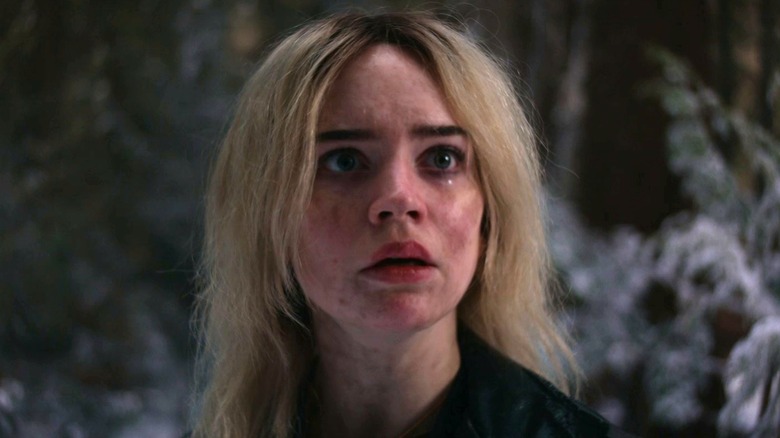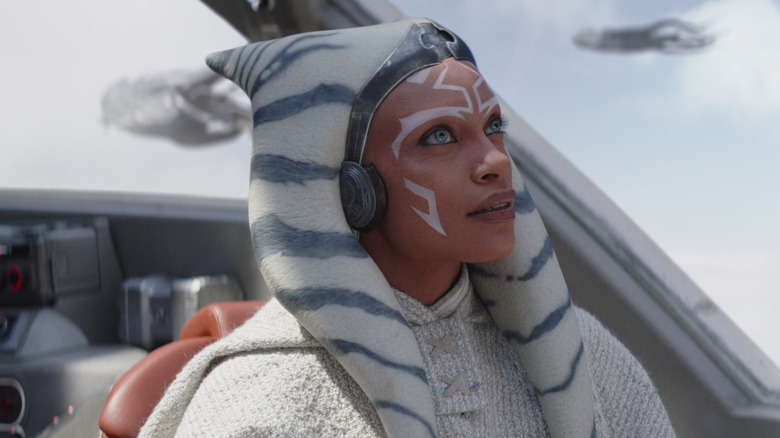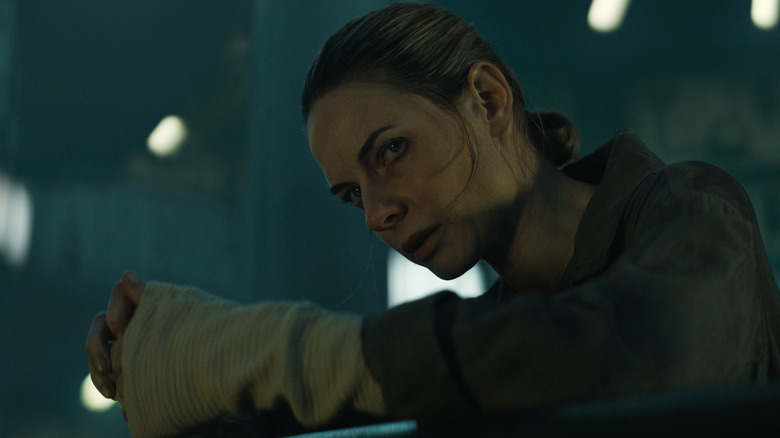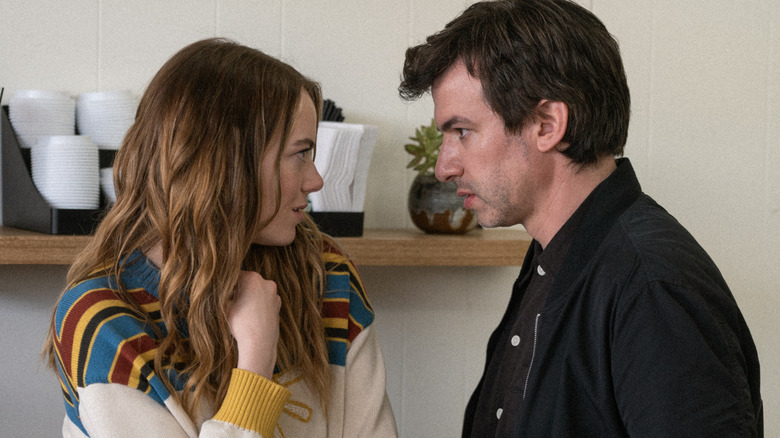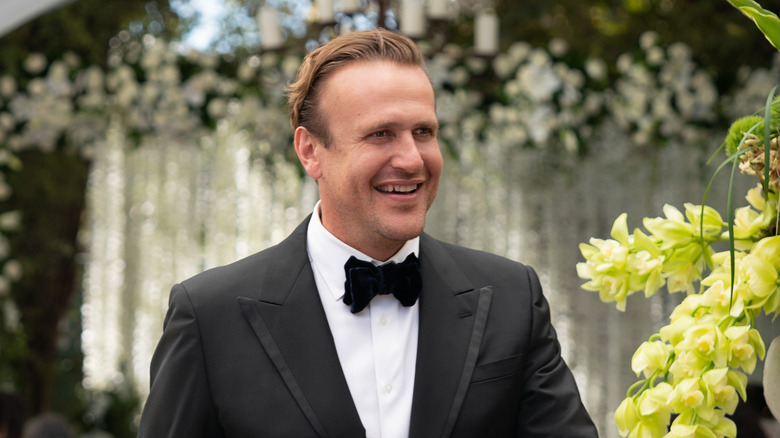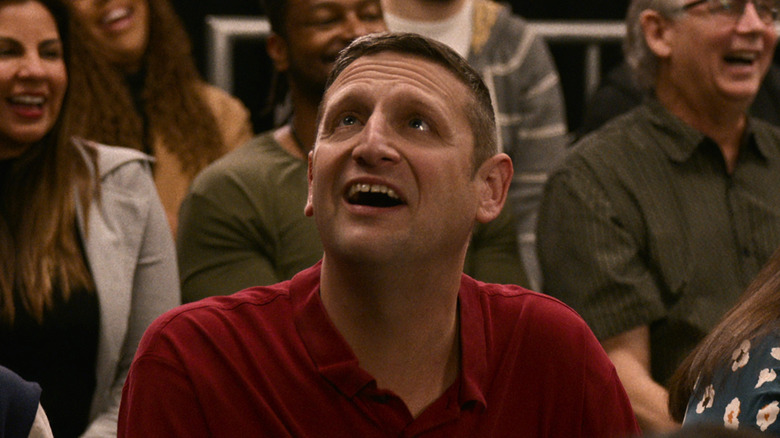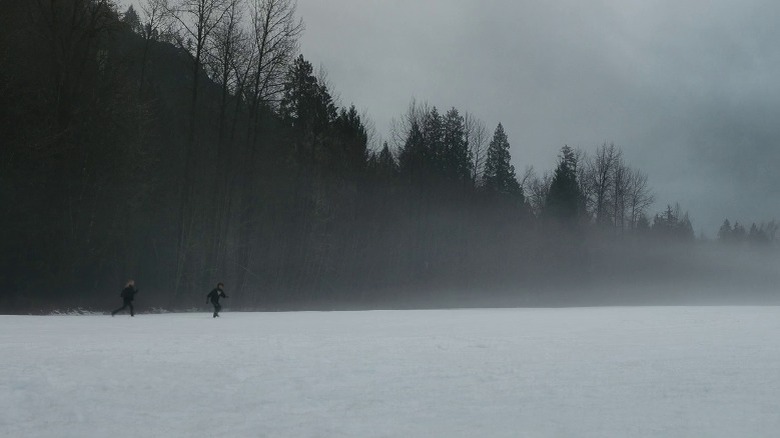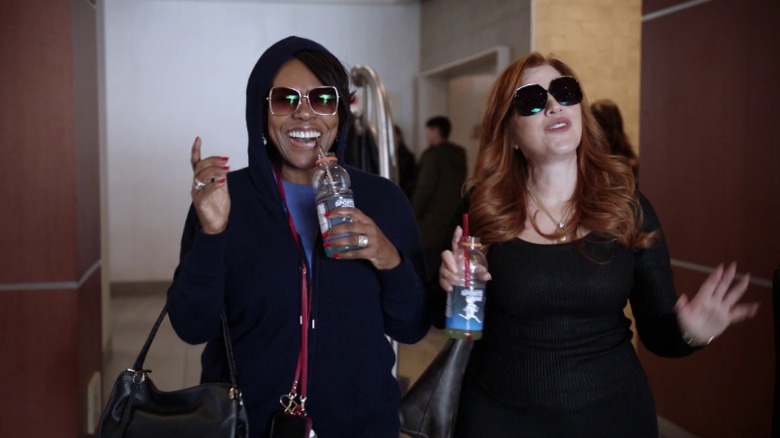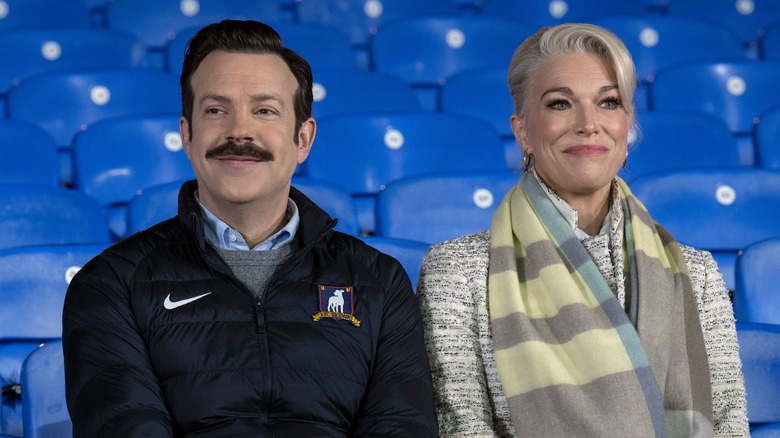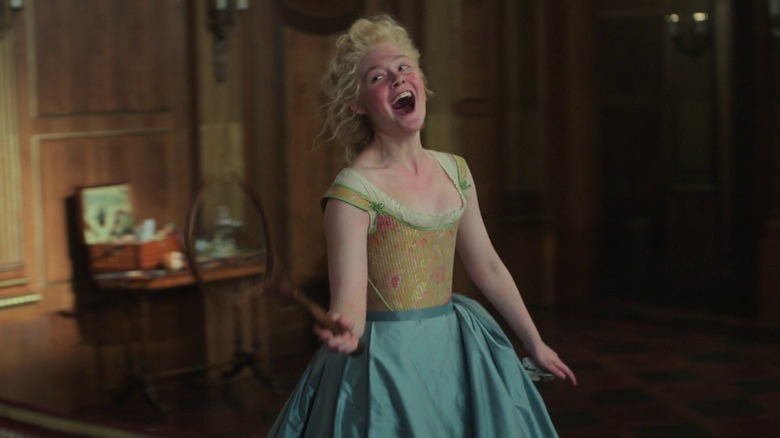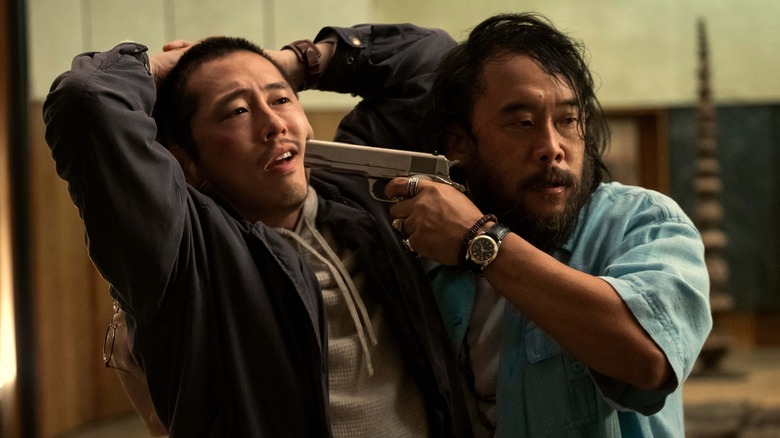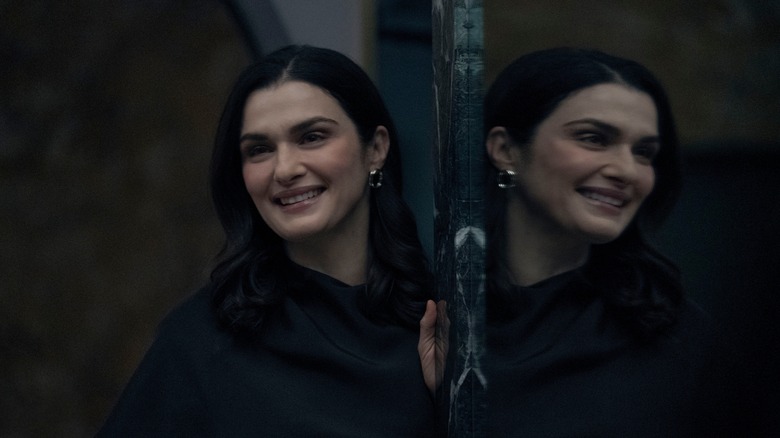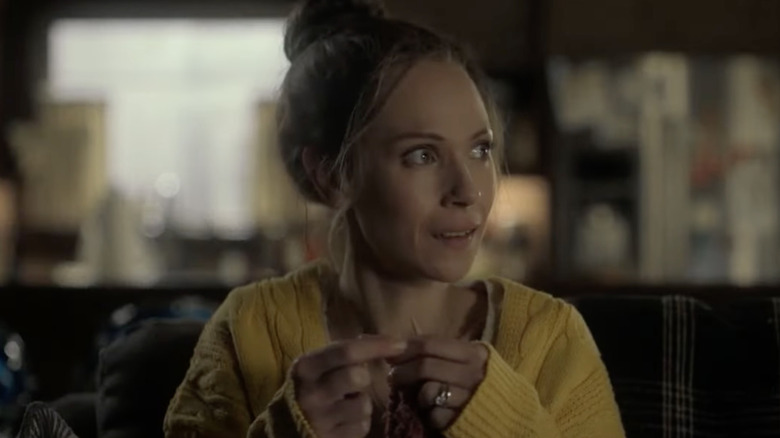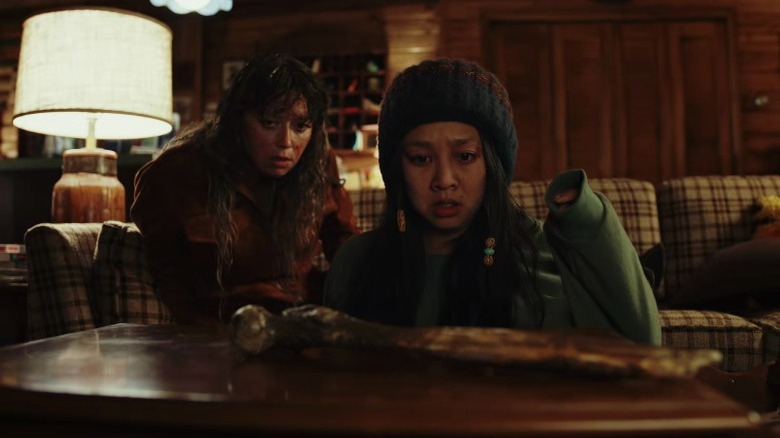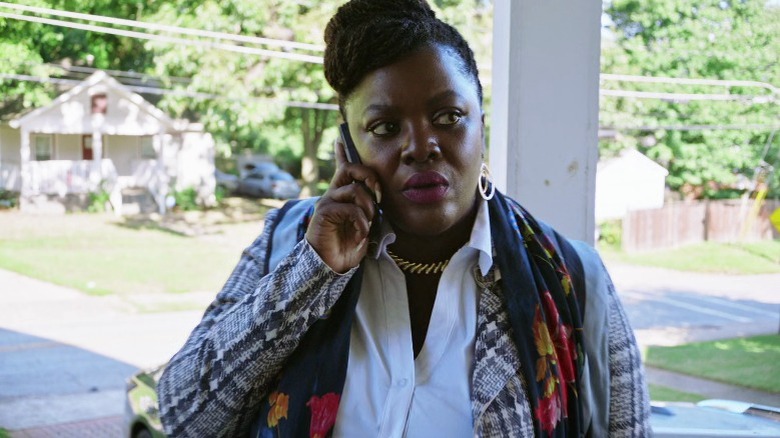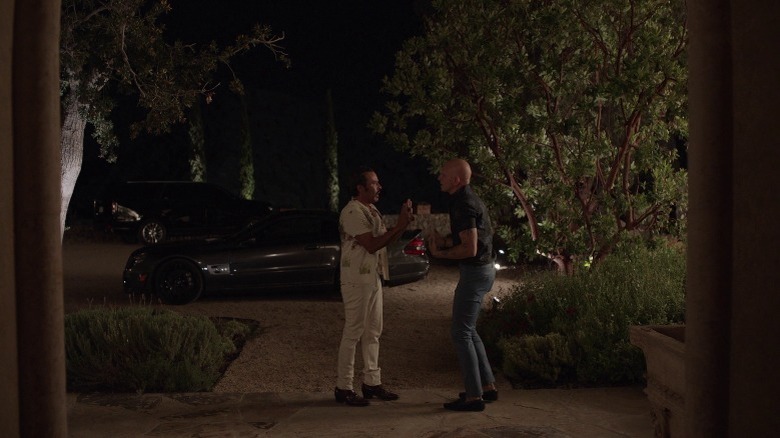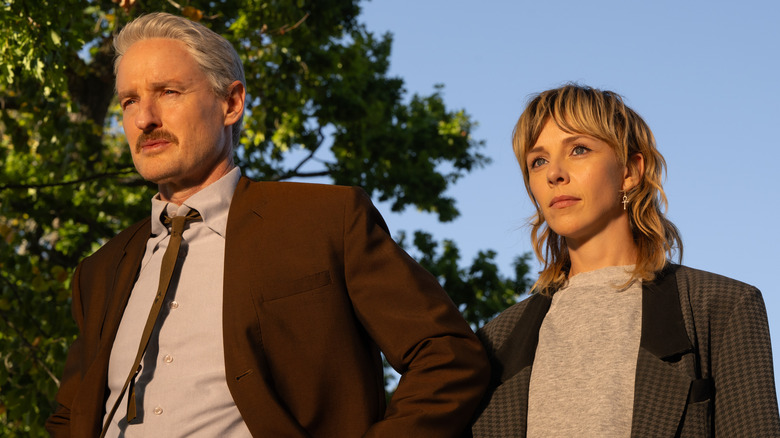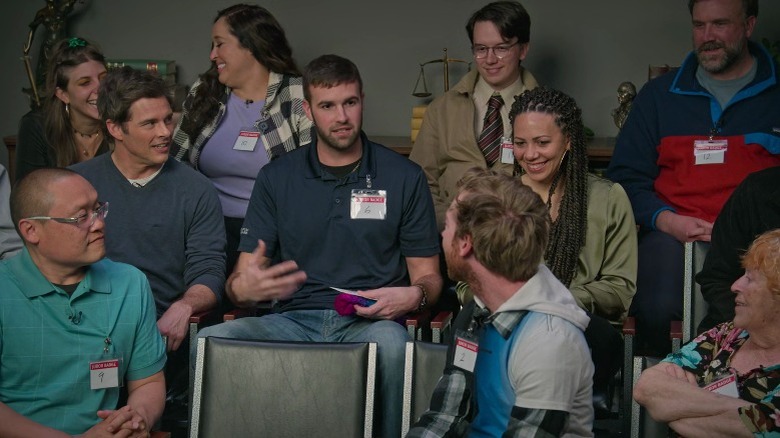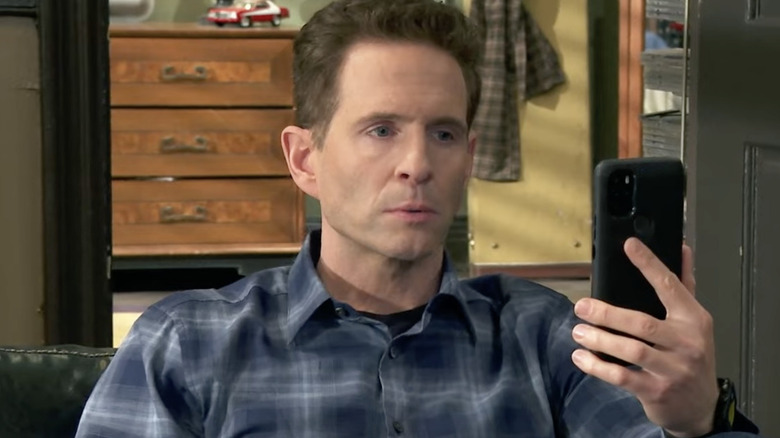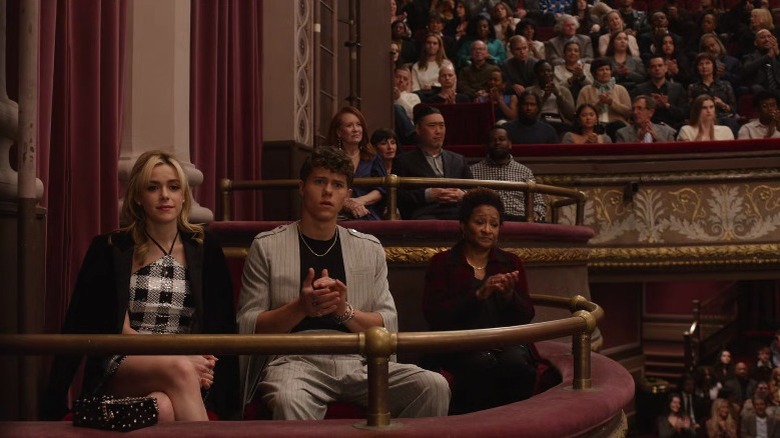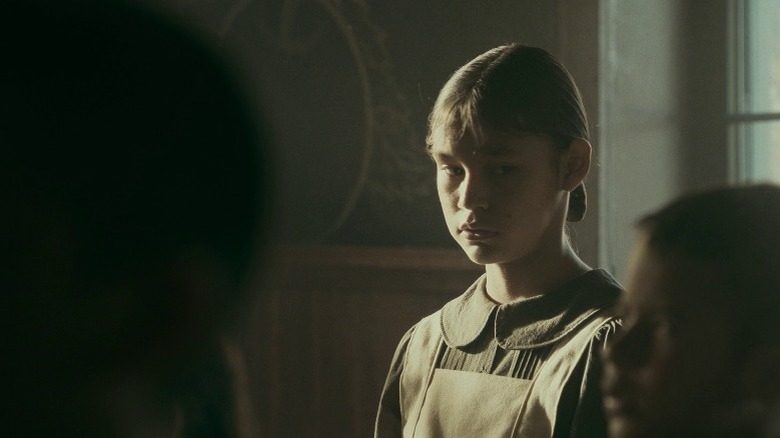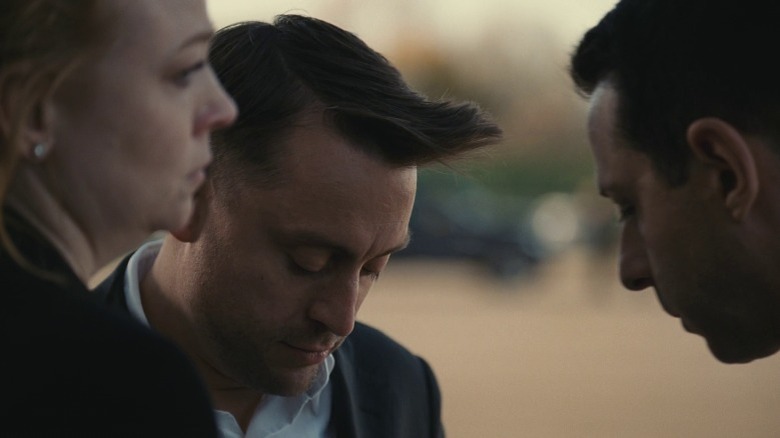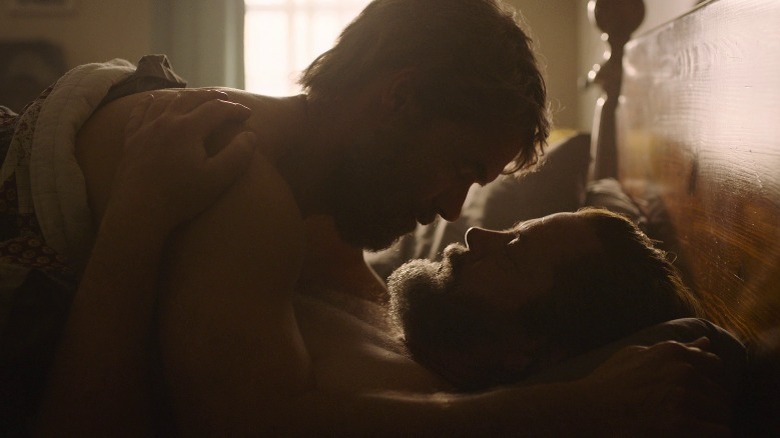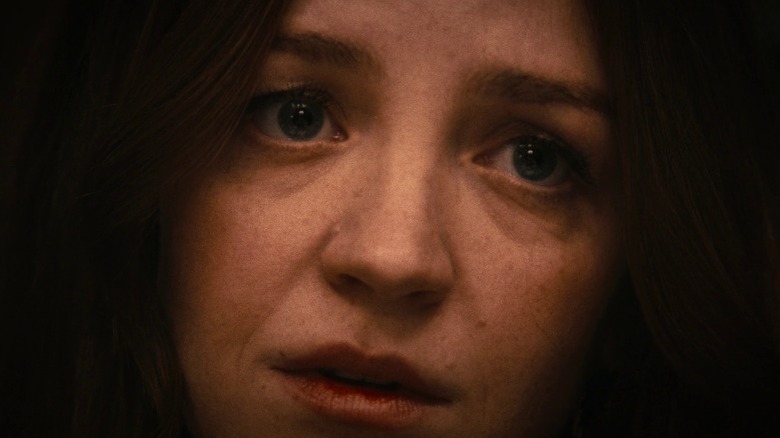The Best TV Episodes Of 2023
Between the streaming bubble that created a nonstop barrage of content, Hollywood labor strikes, and the twilight years of the so-called "Golden Age of Television," many critics would argue that TV is at a decisive crossroads. On one hand, it seems like truly massive hits that can keep audiences around the world talking for days have become fewer and further between. On the other hand, there may never have been a more diverse and adventurous array of great television on offer.
The series represented on this list range from cheeky historical dramas and nightmarish thrillers to pitch-black comedies and innovative prank shows. Some are starkly serialized, while others tell largely self-contained tales from chapter to chapter. What they all have in common is that they're all entirely, unmistakably of 2023 — in themes tackled, in ideas juggled, in the scrappy indie-cinema sensibility that has proliferated across American television in recent years. In the interest of spreading the wealth, the list is limited to one episode per show — but virtually every show here could just as well have landed several more installments on it.
24. Ahsoka - Shadow Warrior
After a couple of tepidly received films, Disney took "Stars Wars" to the small screen and promptly produced several engrossing series for its Disney+ streaming service. A show's increased runtime allows for a more thoughtful and vivid expansion of the "Star Wars" universe, and makes room for more obscure characters to enjoy the spotlight, like Ahsoka. Enter the 2023 limited series "Ahsoka," starring Rosario Dawson as the titular Jedi Padawan, who had previously been confined to animated projects.
Introduced in "The Mandalorian," Ahsoka spends "Ahsoka" conspiring to stop the rise of Grand Admiral Thrawn and the return of the evil Empire. The action, stakes, and presence of "Star Wars" favorites all peak in Episode 5, "Shadow Warrior." While trapped in a purgatorial "World Between Worlds," Ahsoka meets Anakin Skywalker, the future Darth Vader, played by "Star Wars" prequels star Hayden Christensen. He lets Ahsoka know that he's her spiritual guide and protector, and to prove it, they have a duel which results in the psychic transfer of information. This makes the Jedi doubt her path as a warrior. But she decides to soldier on, and thrillingly embarks on the next important mission in her ongoing quest to squelch the villainous uprising.
23. Silo - Machines
Following years of anticipation for an adaptation of Hugh Howey's eponymous sci-fi book series, Apple TV+'s "Silo" came out of the gate swinging as one of the strongest freshman shows of 2023. And although the Graham Yost-developed, Rebecca Ferguson-starring series was unique and exciting from minute one, the episode that really showcased all that "Silo" was capable of was "Machines."
The show's third episode, "Machines" preceded the intense build-up of narrative momentum that continued throughout the rest of the season, but it still stands out as a high watermark because of the deftness with which it sets the stage for the season while also telling the show's most arresting individual story. That would be, of course, the story of Juliette Nichols (Rebecca Ferguson) teaming up with her Mechanical colleagues to repair the Silo's gigantic generator before it breaks down completely.
Because the generator is powered by a steam reservoir that can only withstand being sealed off for 30 minutes before exploding, every second the Mechanical team spends there counts. The Silo will be left permanently without power if the mission fails, so this may well have the highest TV stakes of the year. With the show's Escherian underground setting engulfed in total darkness as Juliette and her team race against the clock to literally save (what's left of) the world, "Machines" serves up first-rate blockbuster entertainment, augmented by the dazzling richness of character and world-building that define "Silo."
22. The Curse - Land of Enchantment
The premiere episode of "The Curse" has a lot of work to do. In addition to establishing the characters and situations that will develop over the course of a season, "Land of Enchantment" must also make it clear that "The Curse" boasts a wholly original tone, as a blend of vicious reality television satire, an extremely intimate look at a faltering marriage, a supernatural tale, a cringe comedy, and an exploration of identity politics and cultural appropriation.
Deadpan arch-prankster Nathan Fielder plays Asher, a scripted version of his deeply off-putting persona from "Nathan for You" and "The Rehearsal." He's developing a reality show called "Flipanthropy" with his ambitious wife, Whitney ( an excellent Emma Stone), in which they convert an economically depressed New Mexico town into a green architecture hotbed. The couple is met with hostility and indifference in the town, and fail in their attempts to conceive a child. A glimpse of their startlingly unconventional sex life also contributes to the overwhelming dysfunction of their lives, as does their seedy and predatory TV producer, Dougie. It all culminates in a moment of intense cynicism, which leads to the titular curse.
21. Shrinking - Closure
Though "Shrinking" airs on Apple TV+ and boasts a rarified pedigree in front of and behind the camera, it's flown under the radar. This is a shame, as it's a project as ambitious and vulnerable as its characters. Created by Bill Lawrence, Brett Goldstein, and star Jason Segel, "Shrinking" is about broken people trying to heal themselves, their relatives, and their coworkers from trauma and grief. That "Shrinking" generates a lot of laughs and empathy out of that premise is no small accomplishment.
In the Season 1 finale "Closure," all the loose threads converge in a cathartic wedding reception dance-off to David Bowie's "Modern Love." Psychiatrist Jimmy is able to put away his deceased wife's personal effects a year after her death, which creates a rift with his teenage daughter. Neighbor Liz musters up the courage to ask Jimmy's live-in patient, Sean, to assist in a catering business. Jimmy's previously estranged best friend prepares to get married. Finally, a last-second twist involving a crime committed by one of Jimmy's patients, seemingly at his recommendation, shakes everything up. It's a lot, and it's a triumph.
20. I Think You Should Leave - I Can Do Whatever I Want
Every time Netflix drops a new season of "I Think You Should Leave with Tim Robinson," the sketch comedy series goes viral for its wildly creative skits, bizarre characters, memorable jokes, and dialogue snippets. "I Can Do Whatever I Want," an episode of the latest season, manages to stand out from the dazzling pack by including what might just be the highest density of all-time great bits of any installment.
In a faux commercial for a product called the Darmine Doggy Door, Robinson plays the company's founder and pitchman, traumatized by a prank involving a dog in a mask. From there, we head into a sketch about a man so proud of his lengthy ponytail that he refuses to have it cut, even after it gets stuck under a car. Then there's a bit about a man who can't pay attention to anything at work because he's obsessed with a disgusting and mathematically illogical PC game about eggs. The 15-minute episode wraps up with Robinson as a sad sack in a sitcom studio audience, who uses the opportunity to be heard on TV to deliver a savage review of a terrible experience he had with a limousine rental company.
19. The Fall of the House of Usher - The Raven
Edgar Allen Poe's "The Fall of the House of Usher" is a horror story about a family haunted by their crumbling estate, first published in 1839. Contemporary horror master Mike Flanagan cleverly adapted the tale into something tangible and up-to-the-minute. In Netflix's eight-episode "The Fall of the House of Usher," the title family gets a backstory and an epic comeuppance, and the whole thing takes place in the present day.
Individually, each member of the corrupt, greedy, pharmaceutical-pushing Usher family dies under strange and violent circumstances. It's all observed by a shapeshifting and vengeful supernatural presence. Finale episode "The Raven" (a reference to Poe's famous gothic poem) shakes things up by taking place mostly in 1979. It shows a turning point in the Ushers' devilish ways: Allies Madeline and Roderick kill a rival to open up his spot on their board of directors and make an unholy deal to guarantee fortune and power. Flash forward 40 years later, and viewers get to see the chilling results of the Ushers' malfeasance, both on the world and themselves.
18. Yellowjackets - It Chooses
Over the course of its first 17 episodes, Showtime's "Yellowjackets" teased out the horrors beyond societal comprehension that Shauna (Melanie Lynskey), Natalie (Juliette Lewis), Taissa (Tawny Cypress), Misty (Christina Ricci), and Lottie (Simone Kessell) had to deal with during their time stranded in the wilderness. But it had never quite made the leap to fully unleashing those horrors on the viewer. That all changed on "It Chooses," the eighth episode of Season 2.
"It Chooses" depicts the moment in which the plane crash survivors finally drop any remaining pretense of civility in their quest for survival, and go fully, horrifyingly feral. The incidents that precipitate the onslaught of madness in the '90s timeline are merely the logical conclusion of where the plot has been heading: After Shauna (Sophie Nélisse) beats Lottie (Courtney Eaton) to near-death, the Yellowjackets finally come to an agreement that they will have to resort to drastic measures in the interest of group survival, and make a decision to draw cards at random to choose one person to kill and eat. That person turns out to be Natalie (Sophie Thatcher), and Travis (Kevin Alves) immediately jumps to her defense. Cue rage, violence, beastlike despair, and a jaw-dropping mob chase through the woods.
In addition to showcasing the existential turning point for the Yellowjackets girls, "It Chooses" also marks the moment in which all secrets finally come out into the open in the present-day timeline. It's the show's darkest, most astonishing hour yet — which is saying a lot.
17. Abbott Elementary - Teacher Conference
"Abbott Elementary" may well be single-handedly keeping the traditional workplace sitcom alive, and, honoring the weight of such a mission, the Quinta Brunson-created series has been able to consistently put the tools in the classic sitcom arsenal to masterful use. This is demonstrated by the 16th episode of Season 2, "Teacher Conference," which gets a lot of mileage out of the time-tested expedient of shipping off the entire main cast on a dynamic-shifting group trip.
At the Philadelphia Teacher Conference, we get to watch the Abbott teachers unwind, blow off steam, get drunk, and spend virtually the entire runtime dealing with the personal lives they're so often forced to de-prioritize. It's a setup that allows the entire cast to put in some of their finest work, from Sheryl Lee Ralph and Lisa Ann Walter on Barbara and Melissa's determined search for relaxation to Chris Perfetti embodying Jacob's crisis of conscience as he faces the realities behind the glossy façade of charter schools. From a plot standpoint, it's also a momentous episode: Towards the end, it's revealed that Draemond Winding (Leslie Odom Jr.) has his sights set on absorbing Abbott Elementary into his charter school operation.
Above all, though, this is the episode in which Janine (Brunson) and Gregory (Tyler James Williams) finally, finally kiss — in a moment so perfect, coming at the end of a miniature romcom story so enormously satisfying, that no "Abbott Elementary" fan could have asked for much more.
16. Ted Lasso - So Long, Farewell
As breezy, sweet, and gentle as "Ted Lasso" always is, series finale "So Long, Farewell" manages to heap on even more charm, aggressive kindness, and comedy as it graduates its characters into the next chapters of their lives. Everyone, from team owner Rebecca to the young players to the support staff to coaches Ted, Roy, and Beard to the redeemed Nate "The Great" all find themselves irrevocably changed for the better by their experiences at Richmond AFC.
The finale also fulfills a goal set forth from the beginning of the series. Through tenacity, perseverance, and goodness, the untested Americans bring the team to the Premier League final — a jumping-off point for the characters' future, and many deeply fulfilling adventures. For some, that means returning to old haunts, and for others, it's all about taking a step into new endeavors.
15. The Great - Ice
The death of a major character will, by definition, provide a shock to any show's system, but in the case of Hulu's "The Great," the shock in question was extra jolting because the offed party in question was Peter (Nicholas Hoult) — one of the show's stars alongside Catherine the Great (Elle Fanning) herself. The series could have, therefore, coasted on shock value alone and probably still managed to offer up a pretty compelling hour of television. But series creator Tony McNamara, who penned "Ice," went far beyond the expected when it came to handling Peter's demise. Fittingly for a show that always drew its greatest strength from Fanning's emotionally vivid rendering of the Russian monarch, "Ice" takes the opportunity to sketch out a potent, radically unusual study on the nature of grief.
The death, in itself, is startling in its meaninglessness: After arguing with Catherine and Grigor (Gwilym Lee) about his decision to go forward with attacking Sweden, Peter starts crossing the frozen lake through which he arrived, only to suddenly fall into it. Even more potent is what comes after it: Instead of accepting and processing, Catherine spends the remainder of the episode holding firm to the belief that Peter didn't actually die. The unfathomable tragedy of having lost her husband is kept entirely at bay as Catherine plunges into deep, fragile, unsustainable recesses of denial. In the process, "The Great" offers Fanning her fullest, most powerful acting showcase yet.
14. Beef - The Great Fabricator
The Lee Sung Jin-created miniseries "Beef" is so addictive and baffling because of the way things escalate for Danny (Steven Yeun) and Amy (Ali Wong), with each impulsive and revenge-fueled decision contributing to transforming their troubled but hitherto normal lives into a maelstrom of senseless rage and violence. Still, up until this point, the stunning development of the plot was countered by a certain amount of hopeful tension — a whisper of possibility that the characters might just find a way to resolve things without crossing over into permanent, irreversible catastrophe.
That all goes up in flames in "The Great Fabricator," the show's second-to-last installment. And it is to the credit of "Beef" that, after we've spent the better part of nine episodes focused on the conflict between Danny and Amy, the downfall of both characters comes as a result of Amy's estrangement from her husband George (Joseph Lee), who has lost all trust in her after seeing how far her obsession has come. Even after Danny accidentally kidnaps June (Remy Holt), Isaac (David Choe) intentionally kidnaps June, and Amy sets up a last-ditch plan to facilitate Isaac's raid on Jordan's (Maria Bello) mansion in exchange for her daughter's safety, everything still could have turned out more-or-less fine. But then George ignores Amy's instructions and calls the cops — and what follows is the grisliest, most dizzying pandemonium that TV has given us in 2023.
13. Dead Ringers - Five
It wasn't necessarily expected that a miniseries remake of "Dead Ringers" would turn out to be one of the best shows of 2023, but hoo boy, did this show defy expectations. With its gender-bent twist and the extra runtime afforded by the six-episode length, the Prime Video medical thriller series was able to burrow even deeper into the story's core themes of bodily autonomy, psychosexual anxiety, and collapsing identity. Any given episode of "Dead Ringers" would frankly be worthy of appearing on this list — but, if attention must be paid to one in particular, it has to be the fifth chapter, which brings the horror to a head by changing the setting from New York City to Montgomery, Alabama.
In "Five," Beverly and Elliot Mantle (both played by Rachel Weisz) travel to open their new birthing center in Montgomery, while being shadowed by the hard-hitting journalist Silas Jordan (Ntare Guma Mbaho Mwine), who has been hired by Rebecca Parker (Jennifer Ehle) to write a puff piece on the twin gynecologists and their trailblazing work. Silas can't help himself and, in between interview sessions, launches into a viciously perceptive assessment of Beverly and Elliot's dynamic, which has only become more complex and brittle with Genevieve (Britne Oldford) out of the picture. Directed by the great Karyn Kusama, "Five" is both an incredible reckoning with the dark psyche of the two sisters, and a terrifying Southern Gothic vision of the misogynistic grotesquerie lying dormant at the heart of America.
12. Fargo - The Tragedy of the Commons
Noah Hawley mines many fascinating and nuanced storylines out of "Fargo," the Coen Brothers' bare-bones 1996 Midwestern crime drama masterpiece. Season 5 of the anthology takes place in 2019, and offers what could be the most well-rounded characters of the whole franchise. Some of them are terrifying, while others are nonchalantly heroic. Dot Lyon is one of the very best, and the season premiere, "The Tragedy of the Commons," neatly lays out why.
Dot seems like a regular doting mother, until she tasers a rowdy riot participant at a school board meeting gone awry. The subsequent arrest puts Dot into the criminal justice system and on the radar of the chilling, iron-fisted sheriff ex-husband from whom she ran away years earlier. He sends his hired goons to get her. After getting pulled over by well-meaning state troopers, Dot escapes and kills one of her attackers in a brutal gas station shootout, then denies it all ever happened. Laced with subtle allusions to the original "Fargo" film, this episode delicately lays out the intertwined relationships of various law enforcement agency officers and local barons of industry, all while remaining totally unpredictable.
11. Poker Face - Escape From Sh*t Mountain
It's hard enough to pick one standout episode out of a great season of television when the season in question is fully serialized and makes up an indivisible whole, as is the case of most shows on this list. But it's even harder to settle on a single great hour in the case of something like "Poker Face," Rian Johnson's bold play at bringing back "Columbo"-style mystery-of-the-week storytelling. Virtually every episode of "Poker Face" is great in its own way, packed with its own jaw-dropping surprises and unforgettable guest turns. Still, the best episode of the first season is almost certainly the penultimate one, "Escape from Sh*t Mountain," which, in addition to boasting Natasha Lyonne's best work as Charlie Cale, also enlists the talents of Joseph Gordon-Levitt, Stephanie Hsu, and David Castañeda.
Structurally, "Escape from Sh*t Mountain" is the most minimalist and self-contained "Poker Face" installment so far. Nearly all of it takes place in a remote roadside motel during a heavy blizzard, with Charlie and the week's newcomers, motel owner Jimmy Silva (Castañeda), criminal former trader Trey Nelson (Gordon-Levitt), and a lonely pickpocket going by Mortimer Bernstein (Hsu), huddled together uncomfortably as the tension surrounding the vanishing of Chloe Jones 10 years earlier rises rapidly. More than any other episode, "Escape" showcases Johnson's way with a good, bare-bones mystery thriller, carefully setting the pieces and ratcheting up the anxiety until everything careens into an intense, deeply smart finale.
10. Swarm - Fallin' Through the Cracks
Anyone who has seen "Atlanta" is familiar with Donald Glover's knack for pushing the boundaries of television and twisting the structural and formal logic of his shows on their head. So it was to be expected that "Swarm," the horror comedy miniseries co-created by Glover and Janine Nabers, would eventually serve up a weirdo episode of its own to rival "Atlanta" classics like "Teddy Perkins" and "The Goof Who Sat By the Door." Sure enough, "Fallin' Through the Cracks" delivered.
The sixth and penultimate episode of "Swarm," "Fallin' Through the Cracks" is presented like a true crime documentary centered around detective Loretta Greene (Heather Alicia Simms) and retracing the events depicted on the show thus far — not a novel concept in the Gloververse. But what makes this mockumentary uniquely clever and mind-bogglingly meta is the fact that, instead of existing as a documentary in the show's world, "Fallin' Through the Cracks" takes place in our world, focusing on the killing spree of the "real" Andrea "Dre" Greene, who is revealed to be a stan and stalker of Beyoncé. Everything we've seen of Dre's (Dominique Fishback) life in "Swarm" so far, including her obsession with Beyoncé-esque pop star Ni'Jah (Nirine S. Brown), is revealed to be a post-fact television dramatization of the "actual" events — with Glover himself appearing at the end of the episode to reveal he's turning it all into a show. The sheer audacity of it all is enough to reconfigure our entire understanding of "Swarm" and its themes.
9. Barry - It Takes a Psycho
"Barry" has proven time and again that it can stand among the greats when it comes to 21st-century television's trove of character studies about bad, bad men. In its own comically-tinged way, it has reached a level of philosophical headiness and psychological acuity on par with anything on "The Sopranos" or "Breaking Bad." But what makes "Barry" special isn't just Barry (Bill Hader) himself — it's the ensemble he's surrounded by.
Any number of great "Barry" episodes could be said to hinge primarily on the stories of Sally Reed, (Sarah Goldberg), Gene Cousineau (Henry Winkler), NoHo Hank (Anthony Carrigan), or Monroe Fuches (Stephen Root). But the final season's fourth episode, "It Takes a Psycho," has the distinction of being the only "Barry" episode that's (almost) entirely Barry-free.
With the titular hitman-turned-actor having escaped prison and gone on the lam, "It Takes a Psycho" steps away from his arc to focus on everyone else's. From Gene's paranoid isolation in a cabin in the woods to Sally's terminal disillusionment with Hollywood to the threats looming over Hank and Cristobal (Michael Irby), every storyline reaches a dark, gut-wrenching point of no return. Even without the shocking time jump that concludes the episode, it would still be a pivotal moment for "Barry," and a reminder of just how many dramatic plates the show was spinning in the lead-up to its explosive final stretch.
8. Loki - Glorious Purpose
While the Marvel Cinematic Universe's theatrical efforts faltered at the box office in 2023, its Disney+ offerings succeeded critically and commercially. "Loki," a particular highlight, unfolds in a manner not unlike its comic book inspirations, and achieves further heights in its second season. This slate of episodes has a lot to say about destiny and identity, and Episode 6, "Glorious Purpose," wraps things up in a truly memorable way.
Imbued with the power to slip through time and change history, Loki embraces his trickster nature in an attempt to save the various branches of time and prevent the destruction of the Temporal Loom. Most climactically, he tries to prevent Sylvie (a version of himself from another timeline) from committing a consequential murder, and dissuades himself from a similar act. Before it's all over, Loki realizes his own glorious purpose and saves all of the realms and fragments of time, even the ones that are fading away. It's all very complicated and comic book-worthy, and "Loki" pulls it off with emotional aplomb and impressive special effects.
7. Jury Duty - The Verdict
2023 has given us a lot of great season finales. Amazon Freevee's "Jury Duty" had the best of them. When your entire show hinges on the comedic magic trick of a fully staged trial populated by exactly one unwitting participant — who somehow has managed to go the whole season unaware that the case is fake — then it stands to reason that the "pulling back the curtain" moment will make for exhilarating television.
Indeed, if every other episode of "Jury Duty" ran on a winning combination of savvy writing and Ronald Gladden's spontaneous reactions and decisions, "The Verdict" delivers a cathartic conclusion by letting the spontaneity run free. The only episode of the first season of "Jury Duty" without a credited writer, it consists, essentially, of a documentary about the cast and crew showing Gladden how the show was put together.
Learning the truth of it all alongside Gladden proves exciting enough for the sheer mechanistic difficulty of pulling off a stunt of that scale; the glimpses we get into the workings of previous episodes make this a mini-masterclass in TV production. But even more incredible is the way that, in moving from make-believe to reality, the episode somehow manages to arrive at a satisfying sitcom denouement by virtue of Gladden's generosity of spirit and genuine sense of connection to his fellow "jurors." The real magic trick, it turns out, was the friends we made along the way.
6. It's Always Sunny in Philadelphia - Dennis Takes a Mental Health Day
Ensemble comedy "It's Always Sunny in Philadelphia" gave co-creator and star Glenn Howerton a solo showcase in 2023 with "Dennis Takes a Mental Health Day." Dennis (Howerton) is baffled by a high blood pressure diagnosis, because he considers himself a perfect specimen of humanity. But when the gang starts a video call and his heart rate grows dangerously elevated, Dennis (and the viewers) understand the implications. So, he elects to take a beach day, away from his idiotic and maddening friends.
A series of relatable and intensely stressful mishaps ensue, allowing Howerton to give a bravura performance full of barely restrained comic anger. He can't get his luxury rental car to work, and gets stranded. Multiple apps meant to make his life easier don't work. The gang keeps trying to bother him. Dennis decides to save his simmering rage for the CEO of the car company, tracks the man down to his beach house, and commits an act of vengeful and comically disgusting violence. No spoilers here, but a twist reminiscent of "The Usual Suspects" proves that Dennis is working on a different, higher level than the fools that surround him.
5. The Other Two - Cary & Brooke Go to an AIDS Play
"The Other Two" never shied away from getting weird, unruly, and chaotic — it's what allowed it, despite not being the most widely seen comedy series, to amass such a devoted fanbase over just three seasons. On no other show could an episode set in a theater during a days-long stage play, following the characters as they struggle to sit through the entire thing in the name of supporting important political art, make sense — let alone work so incredibly well.
Over the course of the production of "8 Gay Men With AIDS: A Poem in Many Hours" and its several intermissions, "The Other Two" brilliantly utilizes the close quarters in which the whole cast is trapped to parade gleefully through one satirical target after another, from Adam McKay to Twitter to Baz Luhrmann's "Romeo + Juliet," with Kiernan Shipka and Lukas Gage turning up to play themselves. As the play goes on and on (and on), the whole thing takes on an air of Charlie Kaufman-style surrealism, allowing both the dry humor and the typically subtle pathos to hit with full force. All in all, it's a perfect showcase for everything that made "The Other Two" great — up to and including a sudden gear shift to drama in the final five minutes, as an ugly, long-overdue confrontation between Brooke (Heléne Yorke) and Lance (Josh Segarra) finally erupts, leaving them in shambles.
4. Reservation Dogs - Deer Lady
If the first two seasons of "Reservation Dogs" had already earned the show a place among the very best of contemporary television, Season 3 somehow managed to up the ante. By peering deeper into the lives and past experiences of Okern's Muscogee elders, the FX on Hulu series was able to weave together an even richer, more expansive, and more historically informed panorama of modern Native American life, while also staying true to the journey of the Rez Dogs and their continuing efforts to find themselves.
Looking at the past more attentively means that this season of "Reservation Dogs" has ventured into the most haunting places, and no episode demonstrates this better than "Deer Lady." Penned by series co-creator Sterlin Harjo and focused entirely on the titular spirit (Kaniehtiio Horn) in both her present interactions with a directionless Bear (D'Pharaoh Woon-A-Tai) and her human past as a child (Georgeanne Growingthunder) in a Native American boarding school, "Deer Lady" is a gift to Horn, who gets to take her always-commanding performance in new, astonishing directions. It's also a horror story, in which the sheer atrocity of the United States' centuries-long history of Native American boarding schools and their rampant torture of Indigenous children is confronted head-on through the lens of Deer Lady's harrowing memories. "Reservation Dogs" continues to be a breakthrough in the reclamation of Native American narratives, and fearless, unforgettable episodes like this one illustrate why.
3. Succession - Connor's Wedding
The question of when, where, and how Logan Roy (Brian Cox) would die hovered over "Succession" from its very first episode — from its very title, even. This was always a show about hapless, emotionally neglected siblings equipping themselves — economically, emotionally, existentially — to deal with the soon-to-come world without their father. Even so, to see it finally happen, unceremoniously, midway through Season 4 wasn't any less of a shock. The image of the series' sovereign evil giant lying unconscious on a private jet carpet, having CPR futilely performed on him, suddenly stripped of all power, suddenly nothing: No one was really prepared for it.
The Roys certainly weren't prepared, and "Connor's Wedding" immediately catapulted itself into the ranks of all-time great TV episodes by staying steadfastly true to the chaos prompted by the news. Abandoning structure and dramatic order in favor of hectic moment-to-moment scrambling the second that Roman (Kieran Culkin) first gets that call from Tom (Matthew Macfadyen), the episode charts the psychological minutiae of Roman, Kendall (Jeremy Strong), and Shiv's (Sarah Snook) stunted, desperately impotent responses to their father's passing with such intimacy that it feels almost punishing to watch. Following the episode in real-time as it originally aired on HBO was an unforgettable, once-in-a-generation experience, as though we were bearing witness to some terrible fever dream. It was a high point in one of the very best TV series ever made.
2. The Last of Us - Long, Long Time
HBO's long-awaited series adaptation of "The Last of Us" could have stopped at being "just" a sturdy, well-made retread of the game's story. But there was much more on the show's mind than mere transposition. The Craig Mazin and Neil Druckmann-created series truly understood the source material and its artistic aims, and used the new format to expand on its vision. As a case in point, the unquestionable high point of the excellent first season depicts events that were only vaguely hinted at in the game.
What makes "The Last of Us" so compelling as a story, after all, is not so much the mechanics of combat and survival, but the underlying questions faced by the characters about what it means to persist and be human in a world ravaged by an apocalypse. And no episode dealt with that question more directly or heartrendingly than "Long, Long Time," in which Joel (Pedro Pascal) and Ellie's (Bella Ramsey) present-day adventures take a backseat to the 20-year love story of Bill (Nick Offerman) and Frank (Murray Bartlett). By finding each other, the two men manage to carve out a little haven of peace and domesticity amidst the world's disarray and find a mutual reason to be alive. There was nothing on TV in 2023 more profoundly touching than this rarely-centered story of two middle-aged male partners growing old together — for as long as they're able to — and somehow rediscovering that every day is a gift.
1. The Bear - Fishes
There's something to be said for a pressure-cooker family dinner episode in the second season of an overachieving dramedy series. Much as the Season 2 premiere of "Fleabag" immediately heralded the show as a major event by confining all its characters to a perfectly-wrought restaurant scuffle, "The Bear" confirmed its status as an American TV classic in the making with a good old-fashioned Berzatto Christmas reunion. In keeping with the show's tendency to suddenly lob bravura pieces of experimental storytelling at the viewer without warning, "Fishes" was the single boldest episode of "The Bear" yet — and the most immaculately crafted hour of television of the year.
The sixth episode of Season 2 doubles the show's usual half-hour length, and then makes every minute of that extended runtime feel crucial. The idea itself isn't tremendously elaborate: Traveling back five years in time, "Fishes" depicts one particularly disastrous Christmas dinner at matriarch Donna Berzatto's (Jamie Lee Curtis) home, back when Michael (Jon Bernthal) was still alive and familial tensions were at an all-time high. It's the execution of that scenario that truly makes "Fishes" a masterpiece, with the verbal, emotional, and physical sparring between its players — including a positively ridiculous plethora of illustrious guest stars — gradually escalating to nuclear levels. By turns hilarious, unbearably stressful, and utterly heartbreaking, this is television drama at its gnarly best.
